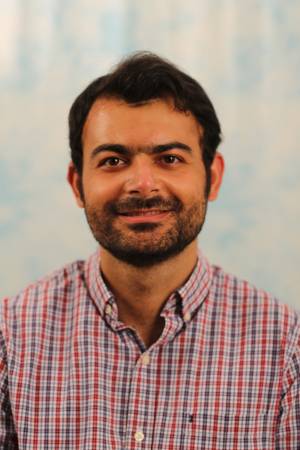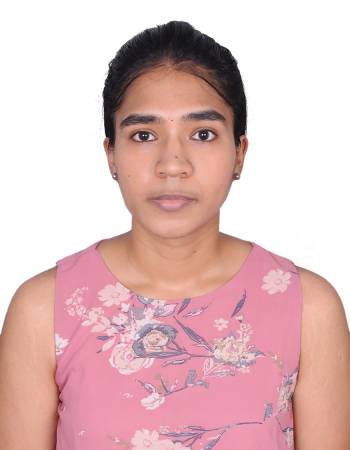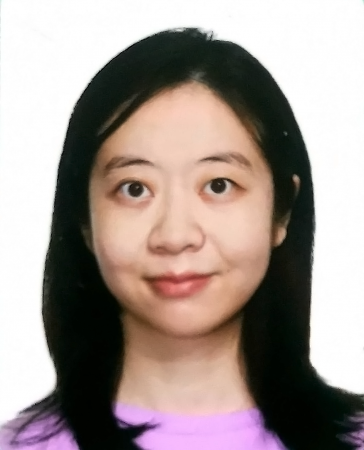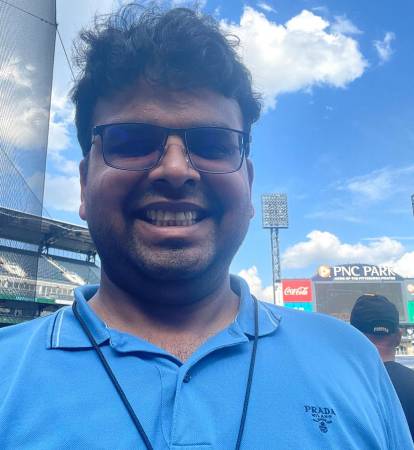MSR Thesis Talk: Heng Yu
Title: Towards Real-time Controllable Neural Face Avatars Abstract: Neural Radiance Fields (NeRF) are compelling techniques for modeling dynamic 3D scenes from 2D image collections. These volumetric representations would be well suited for synthesizing novel facial expressions but for three problems. First, deformable NeRFs are object agnostic and model holistic movement of the scene: they can [...]
MSR Thesis Talk: Winnie Kuang
Title: Design and Integration of Semantic Mapping System for Forest Fire Mitigation Abstract: Remote sensing technologies can provide an automated approach to monitor and analyze conditions in the forest environment over a period of time for forest maintenance and wildfire mitigation efforts. In particular, unmanned aerial vehicles (UAVs) are a promising remote sensing modality since they [...]
MSR Thesis Talk: Jinqi Luo
Title: Vision Model Diagnosis: A Generative Perspective Abstract: In the evolving landscape of computer vision, deep learning has emerged as a transformative force, enhancing a myriad of societal facets. The real-world deployment of such a deep vision model requires a reliable evaluation, particularly when the model can have different sensitivities across various semantic attributes and concepts. [...]
MSR Thesis Talk: Daphne Chen
Title: Learning Task Preferences from Real-World Data Abstract: In order to provide personalized assistance that is capable of adapting to the needs of unique individuals, it is necessary to understand peoples’ preferences for different tasks. Robot assistance often assumes a static model of the individual, while in the real world, people have different capabilities and needs [...]
Unified Control for Over and Fully-Actuated Aerial Vehicles
Abstract: The growing domain of aerial robotics necessitates advancements in the control strategies and robustness of over-actuated and fully-actuated aerial vehicles. This thesis proposal makes contributions to this endeavor by providing in-depth analysis and methodologies concerning these vehicles, control allocation strategies during actuator failures, high-fidelity simulations, and a unified control framework. Our completed work has [...]
MSR Thesis Talk: Prasanna Kettavarapalyam Sriganesh
Title: Fast Staircase Detection and Estimation with Multi-View Merging for Multi-Robot Systems Abstract: When robotic systems are deployed in the real world, they demand advanced mobility capabilities to operate in complex, three-dimensional environments designed for human use, e.g., multi-level buildings. Staircases have been an integral part of facilitating vertical movement in these three-dimensional environments. This work [...]
MSR Thesis Talk: Aarush Gupta
Title: LightSpeed: Light and Fast Neural Light Fields on Mobile Devices Abstract: Real-time novel-view image synthesis on mobile devices is prohibitive due to limited on-device computational power and storage. Using volumetric rendering methods, such as NeRF and its derivatives, on mobile devices is not suitable due to the high computational cost of volumetric rendering. On the [...]
RI Faculty Business Meeting
Meeting for RI Faculty. Discussions include various department topics, policies, and procedures. Generally meets weekly.
MSR Thesis Talk: Akshaya Kesarimangalam Srinivasan
Title: Multi-agent Multi-objective Ergodic Search Abstract: In order to find points of interest in a given domain, many planners use a priori information to guide the search to expedite the detection of targets. We present an approach to direct multiple agents (MA) to search a given domain subject to multiple objectives (MO), each characterized by its own information [...]
MSR Thesis Talk: Joshua Spisak
Title: Stochastic Optimization for Autonomous Navigation, Leveraging Parallel Computation Abstract: Stochastic Optimal Control (SOC) is a framework that allows disturbances and uncertainty in system models to be accounted for in its optimization framework. Despite accounting for this uncertainty, many first and second order methods for solving SOC problems are subject to local minima and are [...]
Carnegie Mellon University
MSR Thesis Talk: Yimin Tang
Title: Solving Multi-Agent Target Assignment and Path Finding with a Single Constraint Tree Abstract: Multi-Agent Path Finding (MAPF) and Combined Target-Assignment and Path-Finding problem (TAPF) arise in many applications such as robotics, computer gaming, warehouse automation and traffic management at road intersections. Combined Target-Assignment and Path-Finding problem (TAPF) requires simultaneously assigning targets to agents and [...]
MSR Thesis Talk: Xuxin Cheng
Title: Learning Legged Robot Agility: Sim-to-Real and Beyond Abstract: Legged robotics has seen significant advancements in both manipulation and locomotion. However, there remain significant gaps compared to their biological counterparts, particularly in energy efficiency, natural motion, and the capacity for agile skills. This thesis primarily focuses on two aspects: the unified control of legged manipulators [...]
MSR Thesis Talk: Harry Freeman
Title: Computer Vision-Based Phenotyping in Agriculture: Leveraging Semantic Information for Non-Destructive Small Crop Analysis Abstract: Fast and reliable non-destructive phenotyping of plants plays an important role in precision agriculture, as the information enables farmers to make real-time crop management decisions without affecting yield. To non-destructively phenotype crops, computer and stereo-vision based methods are commonly used, [...]
MSR Thesis Talk: Nishant Mohanty
Title: Multi-Robot Control using Control Barrier Functions: Theory and Application Abstract: Control Barrier Functions (CBFs) have emerged as a powerful theoretical tool for designing controllers with provable safety guarantees. This work presents a novel methodology that leverages CBFs to synthesize controllers for multi-robot coordination. Two multi-agent use cases are explored, i.e., a) Non-Cooperative Herding and [...]
MSR Thesis Talk: Yuyao Shi
Title: A Learning Approach to Understand How Spinal Cord Learns Multiple Behaviors Abstract: The spinal cord plays a crucial role in the control of human locomotion, generating motor patterns and coordinating reflex responses to sensory signals. Although this spinal control is traditionally viewed as a simple relay system, more recent neurophysiological evidence points to a [...]
Carnegie Mellon University
MSR Thesis Talk: FNU Abhimanyu
Title: Improving Robotic Ultrasound AI Using Optical Flow Abstract: Ultrasound is an important modality for medical intervention such as vascular access because it is safe, portable, and low-cost. However, ultrasound scanning requires trained sonographers who are scarce, and it can be challenging to perform ultrasound examinations in disaster or battlefield scenarios. This motivates us to automate [...]
Vision-based Proprioceptive and Tactile Sensing for Soft Robots
Abstract: Soft robotic manipulators present many unique advantages in difficult manipulation tasks. The inherent compliance of soft robots' constituent deformable material makes them safe and reliable in delicate tasks such as harvesting fruit and assisting in household work. To address challenges in proprioceptive and tactile sensing for soft robots, we present a family of vision-based [...]
MSR Thesis Talk: Lucas Casanova De Oliveira Nogueira
Title: SuperLoop: a LIDAR-based SLAM Back-end for Underground Exploration Abstract: Robots deployed in underground scenarios require a SLAM system that can handle a variety of challenges, such as the absence of GPS, large scale maps, bad illumination, and geometrically degenerate environments. It is nearly impossible for any SLAM solution to handle all these challenges perfectly, specially [...]
Learning via Visual-Tactile Interaction
Abstract: Humans learn by interacting with their surroundings using all of their senses. The first of these senses to develop is touch, and it is the first way that young humans explore their environment, learn about objects, and tune their cost functions (via pain or treats). Yet, robots are often denied this highly informative and [...]
MSR Thesis Talk: Neil Khera
Title: PyCubed-Mini: A Low-Cost, Open-Source Satellite Research Platform Abstract: Satellite development has become more accessible with decreasing launch costs and shrinking hardware. However, the expenses associated with pre-built satellite kits remain high, making it difficult for student and hobbyist teams to participate. The lack of standardized satellite hardware and software further adds to the challenge, [...]
Strategy assessment for solving rich physical problems
Abstract: We present a framework that acts as an "intuitive physics reasoner" which takes in strategies expressed in natural language (whether from a human or LLM), and assesses their validity based on a physics knowledge library. We believe the ability to quickly determine whether a strategy is worth considering and allocating further resources to planning [...]
MSR Thesis Talk: Siva Kailas
Title: Multi-Robot Information Gathering for Spatiotemporal Environment Modelling Abstract: Learning to predict or forecast spatiotemporal (ST) environmental processes from a sparse set of samples collected autonomously is a difficult task from both a sampling perspective (collecting the best sparse samples) and from a learning perspective (predicting unseen locations or forecasting the next timestep). We investigate [...]
MRS Thesis Talk: Ruijie Fu
Title: Towards Mechanical Communication in Multi-Agent Locomotive Systems: Principally Kinematic Robots on a Shared Platform Abstract: Many biological multi-agent systems exhibit a mechanism for information exchange among individuals known as mechanical communication, which leads to the emergence of collective behavior within the group. One such example is the swarming behavior of bacteria, where they form rafts [...]
RI Faculty Business Meeting
Meeting for RI Faculty. Discussions include various department topics, policies, and procedures. Generally meets weekly.
Robot Learning, Wearable Sensing, and Teleoperation in Pursuit of Robotic Caregivers
Abstract Designing safe and reliable robotic assistance for caregiving is a grand challenge in robotics. A sixth of the United States population is over the age of 65 and in 2014 more than a quarter of the population had a disability. Robotic caregivers could positively benefit society; yet, physical robotic assistance presents several challenges and [...]
Personalized Context-aware Affective Nonverbal Robot Feedback
Abstract: We first consider the problem of estimating context, specifically key features of the human state. We predict engagement-related events in an educational activity before the end of that activity, which could allow the robot to provide feedback early enough to improve the human's experience. We then explore generating nonverbal affective robot behavior by correlating [...]
RI Faculty Business Meeting
Meeting for RI Faculty. Discussions include various department topics, policies, and procedures. Generally meets weekly.
Redefining the Perception-Action Interface: Visual Action Representations for Contact-Centric Manipulation
Abstract: In robotics, understanding the link between perception and action is pivotal. Typically, perception systems process sensory data into state representations like segmentations and bounding boxes, which a planner uses to plan actions. However, this state estimation approach can fail in environments with partial observability, and in cases with challenging object properties like transparency and deformability. [...]
RI Picnic
The RI Picnic will be held at the Vietnam Veteran's Pavilion @ Schenley Park on Overlook Drive, Tuesday, August 29, 1-7pm. SOCIALIZE, EAT, DRINK & BE MERRY! Receive this year's RI giveaway item; witness the exciting final rounds of the annual RI croquet tournament; enjoy lawn games right at our own pavilion area. Plan to spend some time at the [...]
Continual Robot Learning: Benchmarks and Modular Methods
Abstract: Humans adapt continuously to the world around us, allowing us to acquire new skills and explore diverse environments seamlessly. Current AI methods, however, cannot attain this versatility. Instead, they are typically trained with vast datasets, and learn all tasks simultaneously. However, the trained models have limited ability to adapt to changing contexts, and are [...]
Architecture and Algorithms for Space-Based Global Wildlife Tracking
Abstract: Accurate satellite based positioning revolutionized several industries over the past two decades from agriculture to transportation. However, conventional GNSS receivers consume significant amounts of energy and are too large for many applications, including wildlife-tracking which is critical for conservation efforts and improving our understanding of the global climate. To address this capability gap, we [...]
Multi-Human 3D Reconstruction from Monocular Videos
Abstract: We study the problem of multi-human 3D reconstruction from videos captured in the wild. Human movements are dynamic, and accurately reconstructing them in various settings is crucial for developing immersive social telepresence, assistive humanoid robots, and augmented reality systems. However, creating such a system requires addressing fundamental issues with previous works regarding the data [...]
Language-Conditioned Object Detection and Manipulation
Abstract: Traditional object detection methods are often confined to predefined object vocabularies, limiting their versatility in real-world scenarios where robots need to understand and execute diverse household tasks. Additionally, the 2D and 3D perception communities have typically pursued separate approaches tailored to their respective domains. In this thesis, we present a language-conditioned object detector with [...]
How I Learned to Love Blobs: The Power of Gaussian Representations in Differentiable Rendering and Optimization
Abstract: In this thesis, we explore the use of Gaussian Representations in multiple application areas of computer vision and robotics. In particular, we design a ray-based differentiable renderer for 3D Gaussians that can be used to solve multiple classic computer vision problems in a unified manner. For example, we can reconstruct 3D shapes from color, [...]
Watch, Practice, Improve: Towards In-the-wild Manipulation
Abstract: The longstanding dream of many roboticists is to see robots perform diverse tasks in diverse environments. To build such a robot that can operate anywhere, many methods train on robotic interaction data. While these approaches have led to significant advances, they rely on heavily engineered setups or high amounts of supervision, neither of which [...]
Generating Beautiful Pixels
Abstract: In this talk, I will present three experiments that use low-level image statistics to generate high-resolution detailed outputs. In the first experiment, I will use 2D pixels to efficiently mine hard examples for better learning. Simply biasing ray sampling towards hard ray examples enables learning of neural fields with more accurate high-frequency detail in less [...]
Towards Reliable Computer Vision Systems
Abstract: The real world has infinite visual variation – across viewpoints, time, space, and curation. As deep visual models become ubiquitous in high-stakes applications, their ability to generalize across such variation becomes increasingly important. In this talk, I will present opportunities to improve such generalization at different stages of the ML lifecycle: first, I will [...]



























